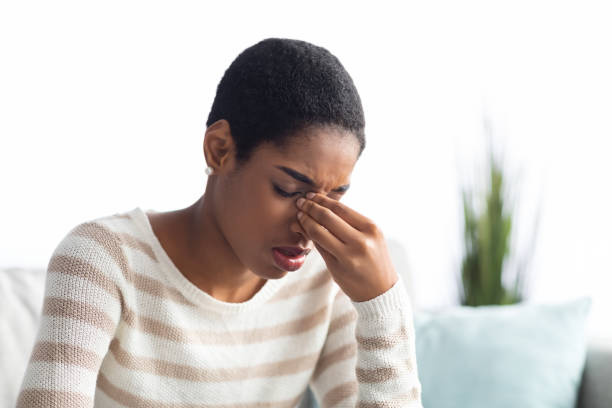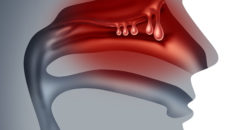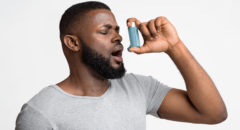
As you know, the older we get, the higher our likelihood is of developing certain conditions and diseases. For instance, people in their 30s and 40s may develop nasal polyps, benign (noncancerous) growths. These growths are often linked to inflammation in the nose lining, a condition known as chronic rhinosinusitis, which men and Black patients are more likely to have. When these growths occur together, they are known as chronic rhinosinusitis with nasal polyps (CRwNP).
If you have nasal polyps, you may be experiencing the following symptoms:
- congestion
- pressure
- loss of smell
- infections
- other sinus-related symptoms
Because nasal polyps can block the inside of your nasal cavity and cause worse symptoms as they grow, treatment will be important. But which treatment is best for you?
RELATED: 7 Surprising Reasons Your Runny Nose Won’t Go Away
Finding the right treatment
In some cases, your best treatment option may be to have the nasal polyps removed entirely through surgery. This is the only way to completely remove the polyps, however, this isn't a foolproof treatment because the nasal polyps can return and is typically considered a last resort.
The good news, however, is that about 80 percent of people find that their polyps shrunk and symptoms subsided with prescription steroid sprays or oral medications.
In general, the treatment you receive will be based on the size and location of your nasal polyps as well as your symptoms:
Nasal sprays
These are the most common medications for nasal polyps. They work by reducing inflammation and polyp size to alleviate symptoms.
The great thing about these newer sprays is that because they are absorbed by your body, they are completely safe to take for several years.
A nonprescription saline spray or rinse is also a good option that can be used multiple times a day to help clear nasal passageways.
Oral steroids
If you have larger nasal polyps, short-term oral steroids may be your best option because they will help shrink the polyps and improve your symptoms, such as loss of smell.
Unlike nasal sprays, oral steroids have some side effects so they are only for temporary use.
Antibiotics
If you are taking steroids and experience infections with your nasal polyps, your doctor may also prescribe you an oral antibiotic medication.
You should be cautious of these because while they may treat your infection, they don't shrink nasal polyps and can cause antibiotic resistance.
Asthma and allergy medications
If you have adult-onset asthma, you are more likely to have nasal polyps, as well as environmental allergies.
The same medications you may be taking to treat your asthma and allergies may also help treat nasal polyps.
- Fluticasone (Flonase) spray is an over-the-counter corticosteroid nasal spray used to treat allergies that can help treat nasal polyps by reducing inflammation.
- Nasal fluticasone is a great treatment option for nasal polyps because it can reach higher in the nasal cavity.
- The leukotriene antagonist montelukast (Singulair) is an oral medication prescribed for allergies and asthma that has been found to help with nasal polyp symptoms in some people.
- Dupilumab (Dupixient) is a biologic medication. It was first used to treat eczema and moderate to severe asthma, but has since been approved by the Food and Drug Administration (FDA) to treat CRwNP.
- Omalizumab (Xolair) is another biologic medication previously used for allergic asthma that has also been recently approved by the FDA for the treatment of CRwNP. If you don't get better after treatment with steroid nasal sprays, this may be a good option.
Ultimately, the treatment option that is best for you will be a combination of your own personal preference as well as the size and location of your nasal polyps. If you are struggling with ongoing congestion, post-nasal drip, or loss of smell from nasal polyps, call your doctor. He or she can help you determine what your best options are.








